Recent Fire Damage Posts
How to Determine the Extent of Fire Damage in Your Home
12/15/2023 (Permalink)
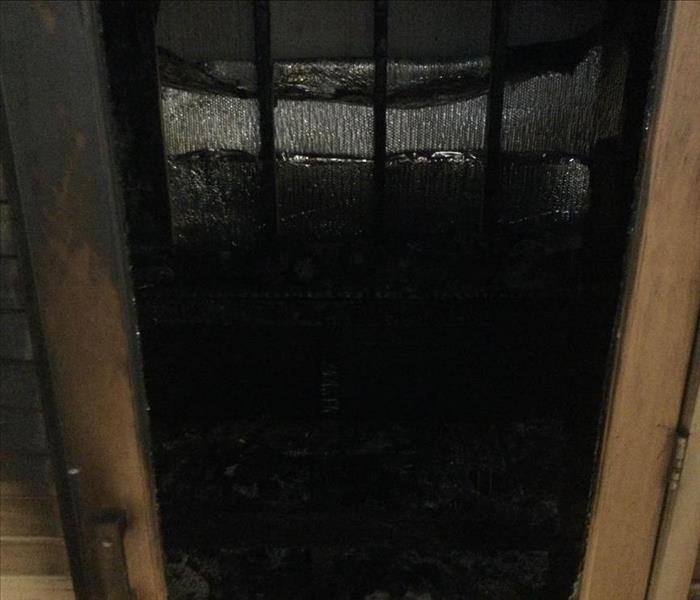 Assessing the extent of fire damage in your home is the first step toward recovery.
Assessing the extent of fire damage in your home is the first step toward recovery.
A fire in your home can be a traumatic experience, but knowing how to assess the extent of fire damage is a crucial first step towards recovery. In this blog, we'll guide you through the process of evaluating the damage, helping you understand what to look for and how to plan for effective restoration.
Structural Assessment
Begin by evaluating the structural integrity of your home. Look for signs of damage to walls, ceilings, floors, and the roof. Pay special attention to:
- Sagging or bowing walls and ceilings
- Cracks in the walls or foundation
- Damage to the structural support system
Soot and Smoke Residue
Soot and smoke residue can cause extensive damage, even in areas untouched by the flames. Inspect your home for:
- Soot on walls, ceilings, and surfaces
- Smoke stains and discoloration
- Smoke odors that persist
Water Damage
Firefighters often use water to extinguish fires, which can lead to water damage. Check for:
- Standing water or waterlogged areas
- Mold or mildew growth
- Water-damaged items like furniture and belongings
Electrical and Utility Systems
Examine your home's electrical and utility systems, as they are often affected by fires. Look for:
- Burnt or melted wiring
- Damaged outlets and switches
- Gas leaks or issues with gas lines
Personal Belongings
Assess the condition of your personal belongings, from furniture to clothing, and determine what can be salvaged and what may need to be replaced.
Health Hazards
Recognize the potential health hazards within your home. Fire can release harmful chemicals and particles into the air. Wear appropriate personal protective equipment (PPE) when inspecting your property.
Document Everything
Document the damage with photographs and notes. This documentation will be crucial for insurance claims and working with restoration professionals.
Seek Professional Help
Fire damage assessment can be complex, and it's often best handled by professionals. Contact a certified fire damage restoration company, like SERVPRO® of Beaufort County, Hilton Head, Bluffton, Jasper, to conduct a thorough evaluation. They can provide a comprehensive assessment and develop a customized restoration plan.
Assessing the extent of fire damage in your home is the first step toward recovery. It's a critical process that should not be rushed, as overlooking any damage can have long-term consequences. Safety should always be your top priority. If you've experienced a fire, know that you're not alone. Our SERVPRO® team is here to help with the assessment, cleanup, and restoration of your home. Our goal is to restore your property to its pre-fire condition, ensuring your peace of mind during this challenging time. Don't hesitate to reach out for assistance and expert guidance.
The Importance of Regular Home Maintenance: Tips and Tricks for Keeping Your House in Top Shape
8/8/2023 (Permalink)
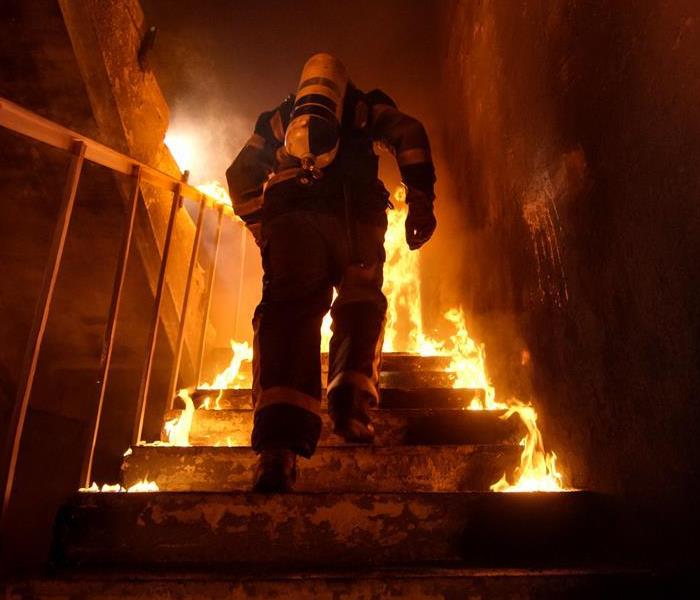 Safety first to protect yourself and others from a natural gas leak.
Safety first to protect yourself and others from a natural gas leak.
Natural gas is a valuable source of energy in many households, but it's important to know what to do if you detect a gas leak. Natural gas is odorless, but gas companies add a distinct odorant called mercaptan to help people identify leaks by scent. If you ever smell this rotten egg-like odor, it is crucial to take immediate action to ensure your safety and the safety of those around you. In this blog post, we will provide you with a step-by-step guide on what to do if you smell natural gas.
Recognize the Signs
The strong odor of natural gas is the primary indication of a gas leak. If you detect this smell, it's important not to ignore it or assume it will go away on its own. Take it seriously and act promptly.
Avoid open flames and electrical devices. Gas leaks can ignite easily, so immediately extinguish any open flames, including candles, matches, or cigarettes. Avoid using electrical devices, as even a small spark can trigger a fire or explosion.
Open Windows and Doors
Create ventilation by opening windows and doors in the affected area. This helps to disperse the gas and reduce the concentration of natural gas in the air.
Evacuate the area if the gas odor is strong or you feel dizzy, lightheaded, or experience difficulty breathing, evacuate the premises immediately. Alert everyone in your household and anyone nearby to leave the area as well. Do not use any electrical devices or operate any switches or appliances as you exit.
Stay Away and Do Not Use Phones
Once outside, move to a safe location away from the source of the gas leak. Do not use your cell phone or landline phone in the vicinity of the leak, as a spark from the phone could ignite the gas.
Contact your gas utility company or the local emergency services from a safe location. Provide them with your name, address, and a detailed description of the gas smell and any related symptoms you or others may have experienced. Follow their instructions and do not return to the area until it is deemed safe to do so.
Avoid Potential Ignition Sources
While waiting for emergency personnel to arrive, do not attempt to turn off gas valves or appliances yourself. Avoid turning on or off any electrical switches or using any devices that could produce a spark, as these actions can cause a gas ignition.
If anyone has been exposed to natural gas for a prolonged period or is experiencing severe symptoms, seek medical attention immediately.
Allow Professionals to Assess and Repair
Gas leaks should only be handled by professionals trained in gas line repairs and maintenance. Once emergency personnel arrive, allow them to assess the situation and carry out any necessary repairs or adjustments safely.
After a gas leak incident, it is essential to schedule a professional gas inspection to ensure there are no further issues with your gas lines or appliances. Regular inspections can help prevent future leaks and ensure the continued safety of your home.
Remember, safety is paramount when it comes to natural gas leaks. Always trust your senses and act promptly if you smell gas. By following these steps and seeking assistance from professionals, you can minimize the risks associated with gas leaks and protect yourself and your loved ones from potential dangers. Stay informed, be prepared, and prioritize your safety when it comes to natural gas.
Soot Webs: What Are They and How to Get Rid of Them?
4/10/2023 (Permalink)
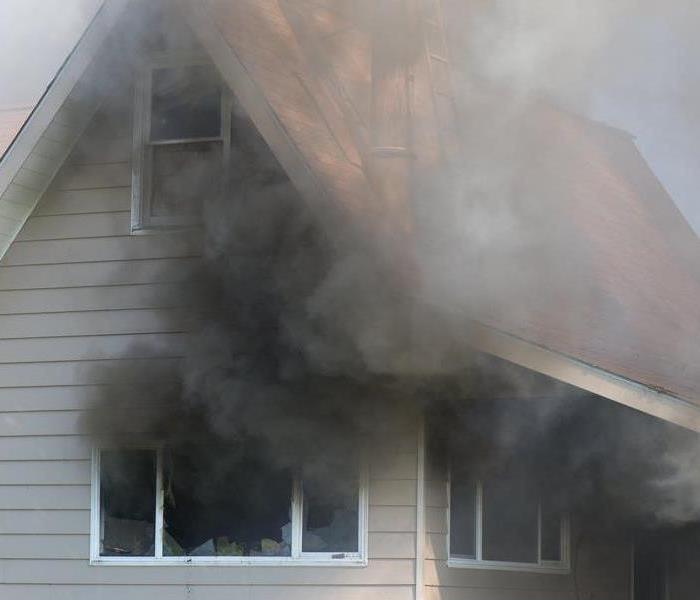 Soot webs, give SERVPRO a call for your fire damage property.
Soot webs, give SERVPRO a call for your fire damage property.
Have you ever noticed a black, cobweb-like substance accumulating around the ceilings, walls, and corners of your home? This is known as soot webs, and they can be a nuisance to clean up. Soot webs are not only unattractive, but they can also be a sign of a more significant problem with your home's heating system. In this blog post, we will discuss what soot webs are, what causes them, and how to prevent them from forming.
Soot webs are not actual cobwebs, but rather they are a collection of fine black particles that have accumulated due to incomplete combustion of fossil fuels such as oil, gas, or wood. These particles are tiny, measuring less than 1 micron in diameter, and are invisible to the naked eye. When they accumulate in large enough quantities, they can create the appearance of a cobweb.
Inefficient Heating
One of the main causes of soot web formation is an inefficient heating system. When fossil fuels are burned, they release a variety of byproducts, including water vapor, carbon dioxide, and particulate matter. Incomplete combustion can result in the release of soot, which can then accumulate on surfaces throughout your home.
Other factors that can contribute to soot web formation include a dirty furnace or boiler, a clogged chimney, and poor ventilation. When your heating system is not functioning properly, it can lead to incomplete combustion of fossil fuels, which in turn can lead to the formation of soot webs.
Underlying Issue
If you notice soot webs in your home, it is important to address the underlying issue promptly. Ignoring the problem can result in more severe issues, including a potential fire hazard. To prevent the formation of soot webs, regular maintenance of your heating system is crucial. This includes regular cleaning of your furnace or boiler, as well as regular chimney cleaning.
Improve Ventilation
You can also take steps to improve the ventilation in your home. This includes opening windows and doors to allow fresh air to circulate and using exhaust fans in areas where moisture is prevalent, such as the bathroom and kitchen.
It is also important to ensure that you are using the correct type of fuel for your heating system. Using a fuel that is not recommended for your particular system can result in incomplete combustion and the formation of soot.
In conclusion, soot webs are a common issue that can be caused by an inefficient heating system, poor ventilation, and the use of incorrect fuel. Regular maintenance of your heating system and proper ventilation can help prevent the formation of soot webs in your home. If you do notice soot webs, it is important to address the underlying issue promptly to prevent any potential fire hazards.
Where Should I Install Smoke Alarms in My Home?
1/18/2023 (Permalink)
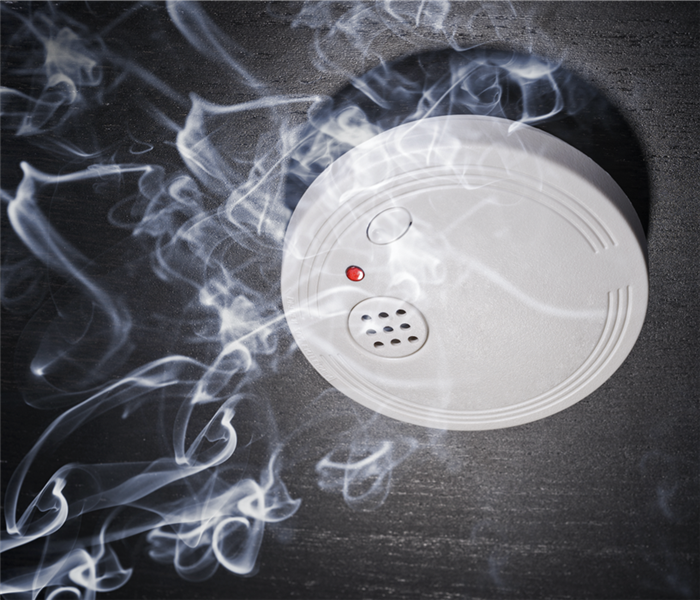 Smoke alarms are a great way to keep your home safe from fire. But, it's important that you know where they should and shouldn't be installed.
Smoke alarms are a great way to keep your home safe from fire. But, it's important that you know where they should and shouldn't be installed.
A fire can be dangerous and deadly, but also preventable. One of the best ways to do this is by making sure your home has smoke alarms installed in strategic locations throughout the house. If you aren't sure where these locations are, or if you aren't sure how many smoke detectors you need, read on to find out more about both topics!
How many smoke detectors are necessary for a home?
The National Fire Protection Association (NFPA) recommends installing smoke alarms on each floor of the house, as well as one smoke alarm in each bedroom. To determine how many smoke detectors you need, you'll need to know how many floors and bedrooms are in your home.
Where are the smoke alarms supposed to be installed?
Smoke alarms are to be installed in every room of your home, as well as near any heat source. This includes fireplaces and space heaters. They should also be placed on each level of a multi-story home, and in any area where people sleep (like bedrooms).
FEMA recommends that you have at least one smoke alarm for every 50 square feet of living space in your home. If you live in a large house with multiple floors, that number goes up to 100 square feet per alarm.
You should also make sure they're easy to reach from anywhere in the house—so don't put them behind closed doors or cabinets!
What locations shouldn't have smoke alarms?
You should not install a smoke alarm in any room, closet, or area of your house that has insufficient air circulation. Areas without adequate ventilation are known as "dead airspaces." These can include bathrooms and attics.
Another important location for your smoke alarms is not within 300 millimeters of a wall-ceiling corner, as this may interfere with the signal strength of your smoke detector. You also want to keep them a few feet away from any high-energy appliances like stoves or ovens, because the heat emitted by these appliances could cause false alarms.
How can you make sure your smoke alarm is working properly?
To test your smoke alarm, you'll need to remove its cover. Pressing the test button should cause it to emit a shrill beeping sound and show a green light on its face. If this doesn't happen, replace the batteries with new ones (or with rechargeable ones if you have those).
Make your home as safe as possible from fire.
With the introduction of smoke alarms, thousands of lives have been saved from fires every year. Smoke alarms are required by law in most jurisdictions and are relatively inexpensive. They can be installed easily but should be replaced every few years due to their limited lifespan. The best time for you to install a new smoke alarm is right now!
Smoke alarms are a great way to keep your home safe from fire. But, it's important that you know where they should be installed and where they shouldn't be installed. You should also make sure that they're working properly by testing them regularly and replacing batteries on a regular basis as well.
Understanding Homeowners' Insurance Coverage for Fire
10/19/2022 (Permalink)
 Having a homeowners’ insurance policy is always a good idea.
Having a homeowners’ insurance policy is always a good idea.
Understanding Homeowners' Insurance Coverage for Fire
For many people, a house is the largest investment they’ll ever make. If your home in Jasper, SC, is financed with a mortgage, your lender will require you to carry homeowners’ insurance to protect their investment and yours. A homeowners’ policy protects the structure of your property and your belongings from certainly covered perils including theft or certain disasters, such as a home fire. Even if you don’t have a mortgage, it’s good to have such a plan in place to cover potential damages and losses. You should know that there are certain situations where your policy won’t cover fire damage.
When Is a Home Fire Not Covered?
While policies will vary based on your insurer, geographic locations, and other criteria, most homeowners’ plans won’t cover the following scenarios:
Arson: If you intentionally set a fire to your house, your policy won’t cover your losses or expenses associated with repair and cleanup.
Unoccupied or vacant property: Most policies won’t cover fire damage and other perils for a home that is vacant. You’ll need to purchase a special type of coverage for a vacant home fire.
Act of war: Generally damage that results from acts of war is not covered.
Acts of war are distinct from those of terrorism, which are usually covered by homeowners’ insurance.
What Else Should You Consider?
Where there’s fire, there’s probably smoke. In the aftermath of a home fire, you may also experience smoke damage, soot damage, and damage from the water used to extinguish the blaze. Water damage can also lead to mold, so it’s important to have a professional residential restoration provider complete cleanup and repairs. The pros can restore your home to preloss conditions.
Having a homeowners’ insurance policy is always a good idea, even if it’s not required. It protects you from having to rebuild or restore property damages out of pocket in most cases. It’s incumbent on you to know when you’re covered and when you’re not.
3 Common Causes of House Fires and How To Prevent Them
8/1/2022 (Permalink)
 Avoid smoking in your home.
Avoid smoking in your home.
Three Ways To Combat the Most Common Types of House Fires
Knowledge is power when it comes to preventing a home fire. Identifying and addressing common fire causes is a simple way to reduce your risk of catastrophe. Here are three ways to combat the most common types of house fire in Jasper, SC.
1. Stop Smoking Already
One of the easiest — not to mention healthiest — ways to curb your fire risk is to avoid smoking in your home. According to a report from the National Fire Protection Agency, smoking materials accounted for over 17,000 home fires in 2014.
If you must smoke, take it outside, and be sure all materials are fully extinguished before you dispose of them.
2. Recognize That Your Kitchen Is Basically Home Fire Central
Year after year, cooking is the No. 1 cause of fire in the home. If you'd prefer not to follow Thanksgiving dinner with a call to your local fire cleaning and restoration company, take these precautions when you cook:
Don't cook when you're sleepy or intoxicated.
Turn off the stove if you have to leave the kitchen.
Don't leave your home if the oven is on.
Keep flammable materials far from the stovetop.
Set a timer to remind you when food is done.
3. Be Smart About Heating Your Home
Home heating efforts are the second leading cause of household fires, and we're not just talking about rustic but unreliable old wood-burning stoves. Here are five ways to keep safe when temperatures drop:
Keep flammable materials 3 feet away from heat sources such as the fireplace, furnace, or space heaters.
Keep kids and pets at least 3 feet away from fires and space heaters, too.
Regularly inspect your fireplace screen for holes that can allow sparks to escape.
Get your chimney and firebox cleaned annually.
Turn off space heaters before going to sleep
The best way to avoid a home fire is a two-pronged plan that pairs education with prevention. Identifying common causes of residential fire and actively avoiding or undoing them is a simple way to significantly lower your risk of fire in Jasper, SC.
Choose the Best Smart Smoke Detector for Your Home
6/21/2022 (Permalink)
 A smart smoke detector protects your property against fire.
A smart smoke detector protects your property against fire.
Select the Most Effective Smart Smoke Detector for Your Residence
A smoke alarm protects against fire danger by emitting a high-pitched noise if it senses smoke. New, smart versions can alert you of smoke even when you aren't home by sending you a phone notification. Here are some criteria to follow when choosing a smart safety device for your Jasper, SC, home.
Review Smart Smoke Detector Tech
There are three types of technology to consider as you search for a smart fire alarm system.
Smart detectors: These sense smoke based on either photoelectric or ionization technology. Both are effective, but ionized detectors tend to give more false alarms. Smart detectors can be battery-operated or connected to a home security system. They also offer automatic sensor tests and the option to silence false alarms.
Smart listeners: These devices plug into outlets and message your phone if a fire alarm goes off. They do not connect to or communicate with detectors. Large homes benefit most from listeners by reducing the need to replace sensors in every room.
Smart batteries: These are used inside a fire detector and notify you by phone if a fire alarm sounds or the battery is running low. You can also use smart batteries to silence false alarms if the detector is solely battery-operated.
Assess Your Budget
A smart smoke alarm usually costs at least $100. House-wide installation of detectors may be the most expensive option, but it also provides extensive long-term protection.
A listener can cost anywhere from $50 to $100, making it less cost-efficient for extensive detector replacement.
Smart batteries are the least expensive technology, ranging between $30 and $40. However, they boast fewer smart applications than detectors and cannot connect to other technology.
Choose Additional Features
Additional features available in a smart smoke alarm can include:
- Carbon monoxide detection
- Motion-sensitive night lights
- Automatic battery checks
- Ability to identify smoke versus steam
New smart technology makes it easier than ever to keep your family and home safe. These criteria will help you choose the best fire safety device to prevent house fires.
How To Avoid a Candle Fire
4/24/2022 (Permalink)
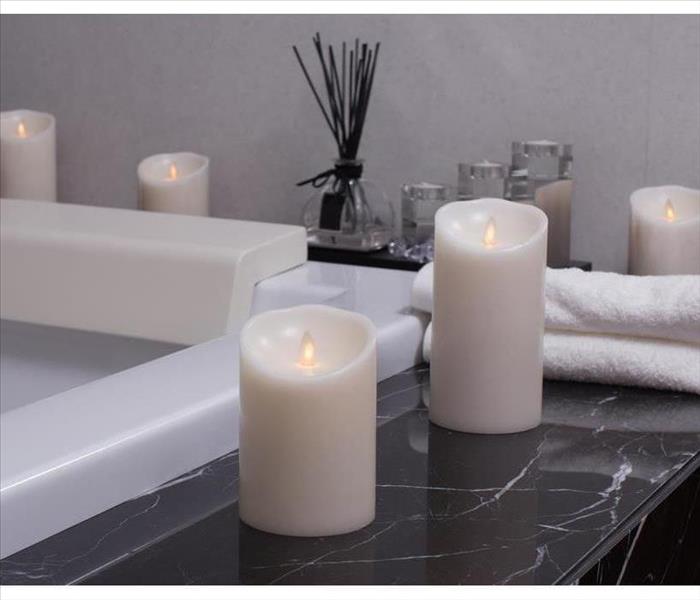 There are flameless alternatives, such as battery-operated candles.
There are flameless alternatives, such as battery-operated candles.
A candle fire at your Hilton Head Island, SC, home is a frightening thought, but many people enjoy candles enough to brave the risk. Fortunately, there are many candle alternatives available, and proper safety measures minimize the possibility of fire for those who choose to enjoy traditional candles.
Alternatives to Candles
There are a variety of alternatives that can be used in place of traditional wick candles. The following are some of the most popular:
- Battery-operated candles
- Reed diffusers
- Wax warmers
- Plug-in air fresheners
Flameless candles are good for those who like the visual effect of a traditional candle but want to minimize fire risk. There are flameless alternatives, such as battery-operated Hanukkah menorahs, available for religious purposes. For those who are more interested in the aromatic experience of candles, air fresheners, reed diffusers and wax warmers are good ways to infuse your home with a pleasing fragrance. Remember to keep oils and wax away from children and pets to prevent burns and accidental ingestion.
Safety Measures
Although there are a variety of candle alternatives available, sometimes homeowners want to burn traditional candles. Fortunately, wick candles can be enjoyed safely if adequate precautions are taken. Be sure not to leave the candle unattended or in reach of pets or children. Do not burn the candle near fabrics or anything else that can catch fire. Keep candles a minimum of three inches apart. Have a fire extinguisher and fire blanket nearby, and test your smoke detectors regularly.
Whether you choose to use one of the many candle alternatives on the market today or practice extra caution using wick candles, it is possible to enjoy the ambiance created by candlelight while avoiding a house fire. If your home does suffer damage from a candle fire, an experienced restoration service can provide the tools and expertise needed to get your home back to normal.




 24/7 Emergency Service
24/7 Emergency Service







